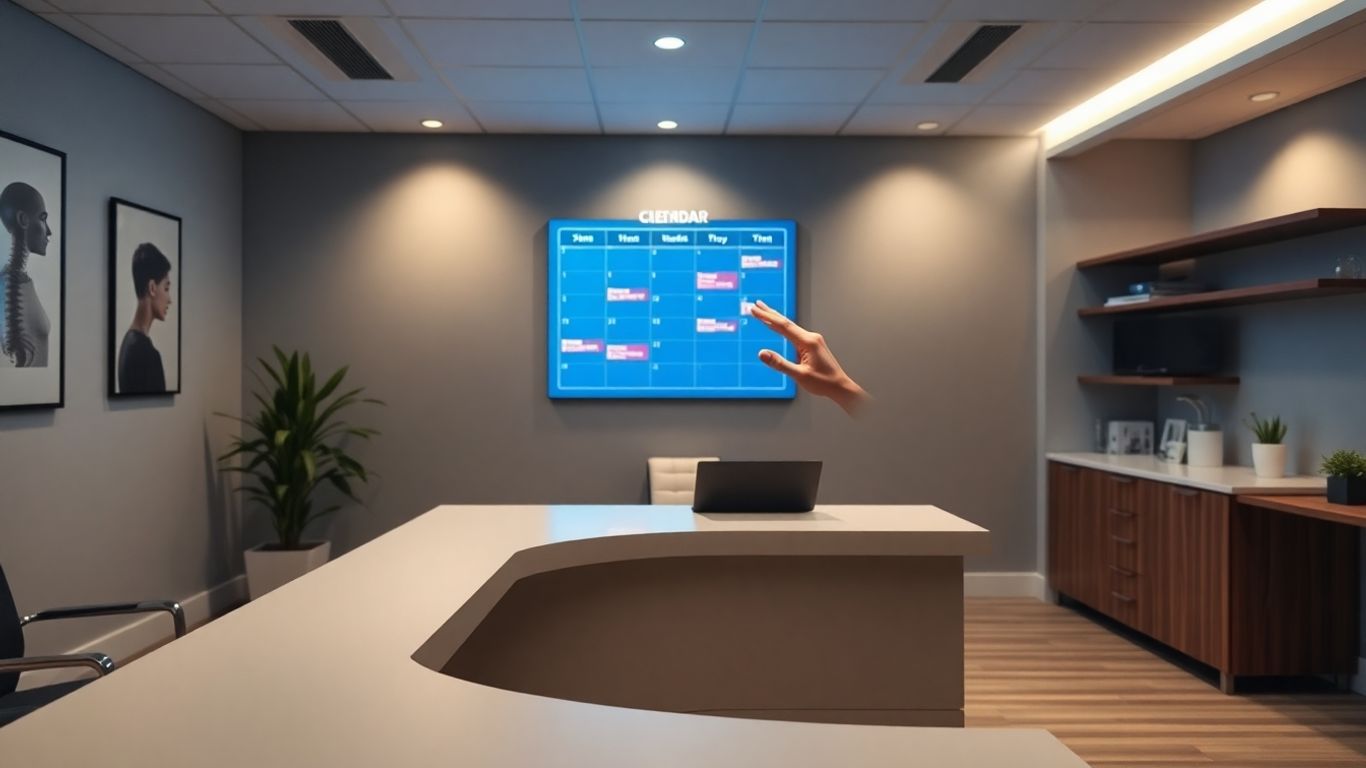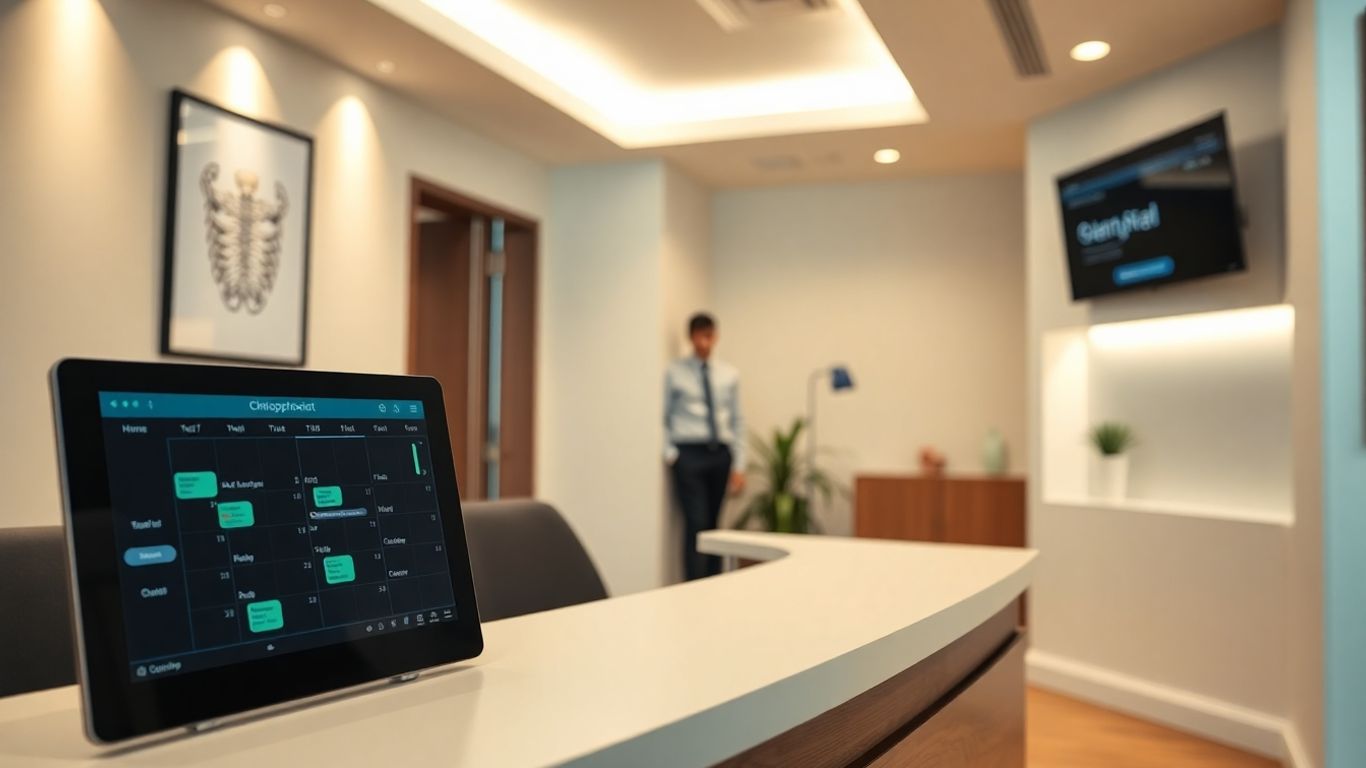Running a chiropractic practice involves a lot of moving parts, and sometimes the administrative side can feel like a real pain in the neck. You're focused on helping patients, but then there are calls to answer, appointments to book, and follow-ups to manage. It's a lot. That's where an ai appointment setter chiropractic practice can really make a difference. Think of it as an extra set of hands, available all the time, that handles the routine stuff so you can focus on what you do best.
Let's talk about making things easier for your chiropractic practice when it comes to talking with patients. You know how it is – the phone rings, messages come in, and your staff is already swamped. An AI appointment setter can really step in and help out.
Booking appointments can feel like a full-time job for your front desk. Patients call, they want to get in, and you need to find a slot that works for everyone. An AI system can handle this. It can chat with patients, show them what times are open on your schedule, and book them right then and there. This means fewer phone calls for your staff and less chance of double-booking or missed appointments. It's like having an extra pair of hands, but one that works 24/7.
Keeping in touch with patients after their visit is important for their care and for keeping them coming back. But who has the time to call everyone? An AI can send out automated check-in messages. It can ask how they're feeling, remind them about their next appointment, or even send helpful tips related to their treatment. This keeps patients engaged and shows them you care, without you having to lift a finger for each individual message.
Patients often have simple questions: What are your hours? Do you take my insurance? How much is a consultation? Answering these over and over can really eat into your day. An AI appointment setter can be trained on all this information. So, when a patient asks, the AI can give them a quick, accurate answer right away. This means patients get the info they need fast, and your team can focus on the patients who are actually in the office or dealing with more complex issues. It's about making sure no question goes unanswered and no patient feels ignored, even when your office is closed.
Your chiropractic practice likely already uses some kind of scheduling software. That's totally fine! Our AI appointment setter is built to play nice with the tools you already have. Think of it like adding a super-efficient assistant who knows how to talk to your existing systems. It doesn't matter if you're using Noterro, ChiroTouch, or something else entirely, this AI can connect. This means your appointment booking process becomes much smoother. When a patient books through the AI, that information gets sent straight to your main calendar. No more double-booking or manual data entry. It's all about making your workflow easier, not adding more steps. We want to help you get more customers by making it simple to book appointments.
This isn't just a one-way street. The AI doesn't just send information to your scheduling tool; it can also receive updates from it. This two-way communication is a big deal. For example, if a patient cancels an appointment directly through your website or office, that update can flow back to the AI. This way, the AI always has the most current information and won't try to book an appointment that's already been cancelled. It's like having a digital assistant who's always in the loop. This constant sync keeps everything accurate and reduces the chance of errors. It really helps make sure your schedule stays perfectly aligned.
Beyond just booking and updating, the AI can be set up to trigger other actions based on what happens. For instance, after a new patient appointment is confirmed, the AI could automatically send a welcome email or a link to intake forms. Or, if a call ends and the AI determines a follow-up is needed, it could create a task in your CRM. These automated actions save your staff a ton of time and make sure important steps aren't missed. It's about creating a connected system where tasks happen automatically in the background, letting you focus on patient care. This kind of automation is what really helps a practice run more efficiently.
Integrating your AI appointment setter with existing software means your practice operates as a single, cohesive unit. Information flows freely, tasks are automated, and your team can spend less time on administrative busywork and more time with patients. It's about making technology work for you, not against you.

Think about it: your chiropractic practice is closed, but a potential patient has a question or needs to book an appointment. What happens? If you're relying solely on human staff, that call might go unanswered, or worse, end up in a voicemail that gets checked hours later. This is where an AI receptionist steps in. It acts as your tireless front desk, available around the clock, ensuring no potential patient inquiry slips through the cracks. This means you're always accessible, even when your physical doors are shut. It’s like having an extra team member who never sleeps, never takes a break, and is always ready to assist. This constant availability can significantly impact how many new patients you attract and retain.
Your patients live busy lives, and their need for care or information doesn't always align with typical business hours. An AI receptionist provides continuous service, handling calls and inquiries 24 hours a day, 7 days a week. This isn't just about answering the phone; it's about providing a consistent, professional point of contact. Whether it's a late-night question about services or an early-morning booking request, the AI is there. This level of constant availability is a huge advantage, especially for practices looking to grow and serve a wider patient base. It helps manage patient expectations and provides immediate support, which is often appreciated.
What kind of questions do patients typically have after hours? It could be anything from

Running a chiropractic practice means juggling a lot of moving parts, and appointment scheduling is a big one. It’s easy to get bogged down in the back-and-forth of finding the right time, sending reminders, and handling cancellations. That’s where intelligent scheduling and automation come in, taking a lot of that headache away.
Forget the endless phone tag. An AI appointment setter can handle the entire booking process for your patients. They can call in, state their needs, and the AI will check your availability in real-time, offering up suitable slots. It’s like having a super-efficient receptionist who never gets tired or makes mistakes. Patients can book appointments using simple voice commands, and the AI guides them through available times, cutting down on wait times and manual effort.
No-shows and last-minute cancellations can really mess with your schedule and revenue. Automated reminders are a lifesaver here. The AI can send out timely reminders via text or email to patients about their upcoming appointments. This simple step significantly reduces the number of missed appointments and late cancellations, helping you keep your schedule full and patients on track with their care.
This is where things get really interesting. The AI doesn't just book and remind; it actively manages your schedule. It can be programmed with specific rules, like blocking out certain times for personal appointments or setting limits on how many new patients you take per day. This means your staff can focus on patient care and other important tasks, rather than constantly being on the phone managing the calendar. It frees up valuable time and resources, allowing your practice to run more smoothly.
The beauty of this system is its ability to adapt to your specific practice needs. You set the rules, and the AI follows them, ensuring that your schedule always reflects your priorities and availability without requiring constant oversight from your team. It’s about working smarter, not harder.
Here’s a quick look at how it streamlines things:

Think about all the time your staff spends on the phone, answering the same questions over and over, or trying to get patients to confirm appointments. It adds up, right? AI can take a huge chunk of that off their plates. For instance, an AI assistant can handle common patient questions like "What are your hours?" or "Do you take my insurance?" instantly. This means your front desk can focus on greeting patients and handling more complex issues instead of being tied up with routine calls. It's about freeing up your team to do what they do best – care for patients.
Patients today expect quick answers and easy ways to interact with your practice. AI chatbots and voice services can provide that 24/7. Imagine a new patient inquiring about services late on a Saturday. Instead of waiting until Monday, an AI can answer their questions and even help them book their first appointment. This kind of instant, accessible communication makes patients feel valued and keeps them engaged with your practice, even outside of business hours. It's like having a helpful assistant always available.
When your administrative tasks are automated and your team has more time, it directly impacts the quality of care you can provide. Less time spent on paperwork and scheduling means more time for patient consultations, treatment planning, and hands-on care. Furthermore, AI can help ensure no patient falls through the cracks. Automated follow-up messages after appointments or reminders for upcoming visits can improve adherence to treatment plans and reduce missed appointments. This consistent communication loop helps patients stay on track with their health goals, leading to better outcomes.
The goal isn't to replace human interaction, but to augment it. By letting AI handle the repetitive, time-consuming tasks, your practice can dedicate more resources and attention to the personalized, human-centered care that chiropractic is all about. This shift allows for deeper patient relationships and more effective treatment.
Here's a quick look at how AI can help:
When a new potential patient reaches out, every second counts. You want to connect with them quickly, show them you're attentive, and get them booked for an appointment. That's where AI really shines for lead follow-up. It can jump into action the moment someone shows interest, making sure no one falls through the cracks.
Imagine this: someone fills out a contact form on your website, or sends a message through social media. Instead of waiting for your staff to see it and respond, an AI can immediately acknowledge their inquiry. It can send a friendly, personalized message, perhaps asking a few qualifying questions or even offering to book a consultation right then and there. This instant engagement makes a huge difference. It shows potential patients you're responsive and ready to help, setting a positive tone from the very start.
Let's be honest, people don't always have the patience to wait. If a potential patient has to wait hours, or even a day, to hear back, they might just move on to the next chiropractor. AI appointment setters can respond in minutes, or even seconds. This speed is a game-changer. It means you're always in the running, and you're capturing interest while it's hot.
Here's a quick look at how response times can change:
Faster responses and consistent engagement naturally lead to more patients. When you're able to connect with leads quickly, answer their initial questions, and guide them toward booking an appointment, you're much more likely to convert that interest into a confirmed visit. The AI can handle the initial heavy lifting, freeing up your team to focus on those leads who are ready for a more in-depth conversation. It's about making the process smoother for everyone involved.
The key is to have a system that can not only respond instantly but also gather the necessary information to qualify the lead. This way, when a human does step in, they're already equipped with context, making the conversion process much more efficient and personal.
Think about how many times your front desk staff has to answer the same questions over and over. "What are your hours?" "How much is a new patient visit?" "Do you take my insurance?" It's a lot, right? AI voice services can take on these common patient queries, freeing up your team to handle more complex tasks or focus on patients in the office. This isn't about replacing your staff; it's about giving them a break from the repetitive stuff.
AI can be trained on all the details about your practice – your services, your hours, your accepted insurance, even common conditions you treat. When a patient calls, the AI can instantly pull up this information and provide accurate answers. It's like having a super-knowledgeable assistant who's always on duty. This means fewer dropped calls because someone's busy, and more satisfied patients who get their questions answered right away.
Beyond just answering questions, AI voice services can actively manage parts of your schedule. Imagine an AI guiding a caller through available appointment slots, booking them directly into your system, and even sending confirmation texts. This reduces the back-and-forth emails or phone tag that often comes with scheduling. It streamlines the whole process, making it easier for patients to get the care they need and for your clinic to run smoothly.
Think about appointment reminders. Instead of staff manually calling or texting everyone, an AI can handle this automatically. It can send out reminders, follow-up messages after an appointment, or even notify patients about upcoming events or special offers. This consistent communication helps reduce no-shows and keeps patients engaged with your practice. It's a way to keep your clinic top-of-mind without adding to your team's workload.
AI voice services can handle a surprising amount of patient interaction without human intervention. This isn't just about saving time; it's about ensuring patients always have a way to connect with your practice, get information, and manage their appointments, even outside of regular business hours.
This AI appointment setter can do more than just talk. It can also send text messages while it's on a call with a patient. You can set up specific situations, like if someone asks about pricing, the AI can automatically text them a link to your rate sheet. It's pretty neat because it means patients get information right away, without the AI having to stop the conversation. You can set up rules for sending links to your booking calendar, product details, or even special offers. It uses smart language understanding, so no complicated coding is needed. Just tell it what to do in plain English, and it handles the rest.
What happens when you can't answer? The AI knows when to offer voicemail. But it doesn't just record a message. It takes that voicemail and turns it into text. This means you can quickly read messages instead of listening to them all. Everything is organized, and you even get alerts when a new message comes in. It’s a simple way to make sure you don't miss anything important, even when you're busy with other patients.
Remember when phone systems could only handle a few calls at once? That's not really an issue anymore. This AI can handle a lot of calls all at the same time. It doesn't get overwhelmed. This means your practice can take on more patients and handle more inquiries without worrying about busy signals or dropped calls. It's like having a whole team of receptionists working at once, but it's just the AI. This really helps when things get hectic, making sure every patient gets through.

You've got this powerful AI receptionist ready to handle calls, but what if you want it to act a certain way? Good news – you're not stuck with a one-size-fits-all solution. You can actually tweak how your AI receptionist operates to fit your practice's specific needs. It’s all about making sure it works for you, not the other way around.
Think of this like setting a budget for your AI's talk time. You can decide exactly how many minutes per day, week, or month you want your AI receptionist to be active. This is super helpful for managing costs, especially if you're just starting out or have periods where you expect fewer calls. It stops unexpected charges from piling up and lets you plan your expenses more predictably. Plus, you can easily adjust these limits as your practice grows or your needs change. If you hit your limit, you can set it up to send calls to voicemail or forward them to a human, so you never miss anything important.
This is where you tell your AI receptionist when to be on duty. You can set specific times for it to answer calls, making sure it aligns with your actual clinic hours. No more getting calls at 3 AM when your office is closed, unless you want it to be. It can also handle holidays and different time zones, so if you're on vacation or have staff working remotely, the AI can adapt. It understands that a call on Christmas Day needs a different response than a call on a regular Tuesday. This context-aware approach means patients get the right information at the right time, making them feel more understood and less frustrated.
Your AI receptionist can be programmed to recognize specific holidays and adjust its availability accordingly. This means it won't try to book appointments on Christmas Day or answer non-urgent queries during your clinic's designated holiday break. Similarly, if your practice serves patients in different time zones, the AI can be configured to understand and respond appropriately based on the caller's local time. This level of customization ensures that your AI receptionist always acts in a way that makes sense for your practice and your patients, no matter the date or time.
The ability to fine-tune your AI receptionist's operational parameters is key to making it a truly integrated and effective part of your practice. It's not just about automating calls; it's about automating them intelligently and in a way that reflects your practice's unique identity and operational rhythm.
Knowing what's happening with your calls and patient interactions is super important. It's not just about answering the phone; it's about understanding the conversations. This is where advanced analytics really shine for your AI appointment setter.
Think of call transcripts and text message logs as a goldmine of information. You can see exactly what was said during appointments booked or questions asked. This helps you spot trends, understand common patient concerns, and even identify areas where your AI might need a little tweaking. It’s like having a detailed diary of your practice's communication.
Manually sifting through hours of calls or endless text threads would take forever. That's where AI steps in. It can automatically pull out key details from these conversations. Imagine it identifying all patients who mentioned a specific symptom or asked about a particular service. This makes it way easier to follow up or make informed decisions about your practice.
Don't want to miss something important? You can set up alerts. For example, get a notification if a patient expresses urgent pain or if a high-value lead hangs up unexpectedly. This way, you're always in the loop and can react quickly when it matters most. It's about getting the right information to the right people at the right time, without you having to constantly check everything yourself.
Here's a quick look at what you can track:
Understanding the data from your AI appointment setter isn't just about numbers; it's about getting a clearer picture of your patient interactions. This insight helps you refine your services, improve communication, and ultimately run a smoother, more patient-focused practice. It's about making smart decisions based on real conversations.
Want to understand your business better? Our advanced analytics tools can help you find important information. See what's working and what's not, so you can make smart choices. Ready to see the difference? Visit our website to learn more!
So, there you have it. Bringing an AI appointment setter into your chiropractic practice isn't some futuristic dream anymore; it's a practical step you can take right now. It's about freeing up your time, making sure no patient call gets missed, and generally just making your day-to-day operations run a whole lot smoother. Think of it as getting a super-reliable assistant who works around the clock without needing breaks. It really can make a big difference in how you run things and, more importantly, how much time you have to actually focus on your patients.
Think of an AI appointment setter as a super-smart helper for your office. It's like a virtual receptionist that can answer calls, chat with patients through text, and book appointments all by itself. It works 24/7, so it never misses a chance to help a patient or bring in a new one.
It makes things much easier! It can book appointments for patients anytime, even when your office is closed. It also reminds patients about their visits, so fewer people forget. Plus, it can answer common questions patients have, freeing up your staff to focus on giving great care.
Yes, absolutely! These AI tools are designed to work with the scheduling software you already use. They can talk to each other, sending information back and forth so everything stays up-to-date without you having to do extra work.
The goal is for the AI to sound as natural as possible, almost like a real person. It's trained to understand and respond in a friendly, helpful way. Most patients won't even realize they're interacting with an AI, especially when it's handling simple tasks like booking appointments.
If the AI can't answer a question or if the situation is complex, it can be set up to smoothly hand the call or message over to a human member of your staff. This way, patients always get the help they need, whether it's from the AI or your team.
When new potential patients reach out, the AI can respond right away, answer their initial questions, and help them book their first appointment. This quick response time is super important because it makes it much more likely that they'll become actual patients instead of going somewhere else.
Not at all! Most of these systems are made to be easy to set up, often in just a few minutes. You tell the AI about your practice, like your services and hours, and it's ready to go. Using it is also simple, with clear ways to manage settings and see how it's working.
Definitely! Sending out reminders before appointments is a key job for the AI. It can also send follow-up messages after a visit to check in, making sure patients feel cared for and are more likely to return. This helps keep your schedule full and your patients happy.
Start your free trial for My AI Front Desk today, it takes minutes to setup!








